
Current Hematologic Malignancy Reports
Scope & Guideline
Fostering Collaboration in Hematology and Oncology
Introduction
Aims and Scopes
- Clinical Management of Hematologic Malignancies:
The journal covers various aspects of the clinical management of hematologic cancers, including treatment strategies, patient care, and management of side effects associated with therapies. - Innovative Therapeutic Approaches:
A significant emphasis is placed on novel therapies, including targeted therapies, immunotherapies, and emerging treatment modalities that are reshaping the landscape of hematologic malignancies. - Biomarkers and Disease Monitoring:
Research on biomarkers for diagnosis, prognosis, and monitoring of treatment responses, particularly in the context of measurable residual disease (MRD) and precision medicine, is a core focus. - Patient-Centered Care and Quality of Life:
The journal emphasizes the importance of patient-centered approaches, including the evaluation of quality of life and psychosocial factors in the management of hematologic malignancies. - Multidisciplinary Approaches and Collaborative Care:
It promotes a multidisciplinary perspective, highlighting the importance of collaboration among hematologists, oncologists, pathologists, and other healthcare professionals in the treatment of hematologic malignancies.
Trending and Emerging
- Targeted and Bispecific Antibody Therapies:
There is a growing focus on targeted therapies and bispecific antibodies, particularly in the treatment of multiple myeloma and other hematologic malignancies, highlighting advancements in precision medicine. - Impact of Technology in Patient Management:
Emerging themes related to the use of technology, such as digital interventions and telemedicine, are increasingly prominent, reflecting the adaptation of healthcare delivery to enhance patient engagement and care. - Research on MRD and Disease Monitoring Techniques:
The trend towards understanding measurable residual disease (MRD) and its implications for treatment decisions is gaining traction, emphasizing its critical role in the management of various hematologic malignancies. - Patient Quality of Life and Financial Toxicity:
There is an increased emphasis on the quality of life for patients and the financial implications of treatment, addressing the holistic aspects of patient care and the socioeconomic challenges faced by individuals with hematologic malignancies. - Emerging Insights into Genetic and Molecular Pathogenesis:
Recent publications highlight a trend towards understanding the genetic and molecular underpinnings of hematologic malignancies, paving the way for novel therapeutic targets and improved prognostic stratification.
Declining or Waning
- Traditional Chemotherapy Regimens:
There is a noticeable reduction in articles focusing on traditional chemotherapy regimens, as the field shifts towards targeted therapies and personalized medicine, reflecting a broader trend in oncology. - Conventional Diagnostic Techniques:
The use of conventional diagnostic techniques is mentioned less frequently, as advancements in molecular profiling and next-generation sequencing are becoming the standard, indicating a transition towards more sophisticated diagnostic approaches. - Generalized Treatment Protocols:
There is a decline in the publication of generalized treatment protocols, with a growing focus on tailored treatment strategies that consider individual patient characteristics and disease biology.
Similar Journals

Hemato
Transforming Discoveries into Global Health SolutionsHemato is a pioneering open-access journal dedicated to the field of hematology, published by the esteemed MDPI from its base in Basel, Switzerland. Launched in 2020, this journal aims to provide a platform for researchers, clinicians, and professionals to share significant findings and advancements in blood-related disciplines over a converged timeframe until 2024. With a commitment to disseminating high-quality research, Hemato seeks to foster collaboration and innovation in hematological studies, showcasing original articles, reviews, and clinical studies that contribute to expanding knowledge in this vital area. As an open-access journal, it promotes accessible scholarship, ensuring that groundbreaking research reaches a broad audience, thereby enhancing the impact on the global health community.

RHEUMATOLOGY INTERNATIONAL
Transforming understanding through rigorous research.Rheumatology International, published by Springer Heidelberg, is a prestigious journal that focuses on innovative research in the field of rheumatology and immunology. Established in 1981, this peer-reviewed journal has contributed significantly to advancing our understanding of autoimmune disorders, clinical approaches, and therapeutic interventions. It holds a commendable Q2 ranking in the categories of Immunology, Immunology and Allergy, and Rheumatology as of 2023, showcasing its influence and importance within these disciplines. With a robust Scopus ranking—positioned 14 out of 73 in Medicine Rheumatology—it caters to a diverse audience of researchers, clinicians, and students committed to improving patient care and treatment modalities. Although it does not currently offer open access options, the journal remains a vital resource for insights on contemporary challenges and breakthroughs in rheumatological research, published from its base in Heidelberg, Germany.

Advances in Digestive Medicine
Innovating the Future of Digestive MedicineAdvances in Digestive Medicine is a premier scholarly journal dedicated to the evolving field of gastrointestinal health and diseases. Published by WILEY, this journal aims to disseminate high-quality research encompassing a wide range of topics related to digestive medicine, from foundational studies to innovative clinical applications. As a significant resource for researchers, professionals, and students alike, Advances in Digestive Medicine fosters a deeper understanding of digestive disorders, promoting collaboration and knowledge exchange within the scientific community. Although it offers subscription-based access, the journal ensures comprehensive coverage of groundbreaking studies that significantly impact clinical practice and patient care in the field. With an ISSN of 2351-9797 and an E-ISSN of 2351-9800, it stands as an essential platform for anyone involved in digestive health research.

BLOOD REVIEWS
Unveiling the latest in blood research and treatment.BLOOD REVIEWS is a highly regarded journal published by Churchill Livingstone, specializing in the fields of Hematology and Oncology. With an impressive Q1 ranking in both disciplines and placing in the top 10% of its peer categories according to Scopus metrics, it provides an essential platform for the dissemination of cutting-edge research and reviews pertaining to blood disorders and cancer treatment. Since its inception in 1987 and continuing through 2024, the journal has established itself as a cornerstone for healthcare professionals, researchers, and students who seek to advance their understanding of hematologic and oncologic topics. While not an open-access journal, BLOOD REVIEWS retains a reputation for delivering high-quality, peer-reviewed articles that foster dialogue and innovation within the scientific community. For those in the United States and beyond, the journal serves as a vital resource, housed at the Journal Production Department in Edinburgh, Scotland, ensuring accessibility and a global reach in its critical academic contributions.
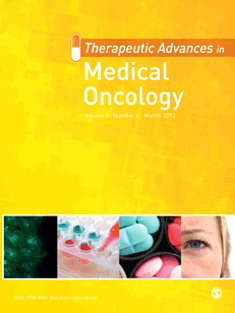
Therapeutic Advances in Medical Oncology
Transforming oncology with groundbreaking discoveries.Therapeutic Advances in Medical Oncology, an esteemed journal published by SAGE Publications Ltd, serves as a critical platform for disseminating high-quality research pertinent to the field of oncology. Indexed under the ISSN 1758-8340 and E-ISSN 1758-8359, this Open Access journal has made significant strides since its inception in 2009, attaining a commendable rank of #78 out of 404 in the Medicine - Oncology category of Scopus, placing it in the top 20th percentile of journals. With its category quartile of Q1 established in 2023, it underscores the journal’s commitment to advancing therapeutic approaches in oncology, making it an invaluable resource for researchers, clinicians, and students alike. Offering unrestricted access to pioneering studies since 2017, it aligns with the global movement towards open science, fostering collaboration and innovation among professionals striving to improve cancer treatment outcomes. By bridging the gap between research and clinical practice, Therapeutic Advances in Medical Oncology plays a vital role in shaping the future of cancer therapy.
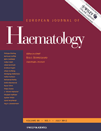
EUROPEAN JOURNAL OF HAEMATOLOGY
Connecting Experts in the Evolving Field of HematologyEUROPEAN JOURNAL OF HAEMATOLOGY, published by Wiley, serves as a vital resource for experts in the field of hematology, focusing on the latest advancements in blood disorders and therapies. With an ISSN of 0902-4441 and an E-ISSN of 1600-0609, this esteemed journal has been disseminating knowledge since 1986 and continues to thrive, converging its visionary approach through to 2024. Notably, it holds a distinguished Q2 ranking in Hematology and an impressive Q1 ranking in the broader category of Medicine (miscellaneous) as of 2023, highlighting its significant contribution to the scientific community. With a Scopus rank of #45/137 and a 67th percentile in the field, the journal is recognized for its rigorous peer-reviewed research, making it an indispensable publication for researchers, practitioners, and students aiming to stay at the forefront of hematological studies. Though not an open-access journal, it ensures broad accessibility to critical findings via its subscription model, thus fostering an informed and globally engaged audience.

Precision Medical Sciences
Transforming healthcare through precision insights.Precision Medical Sciences is a pioneering open-access journal, launched in 2020 and published by the esteemed WILEY, dedicated to disseminating cutting-edge research and advancements in the field of precision medicine. With the ISSN 2642-2514, this journal serves as a critical platform for researchers, healthcare professionals, and students to explore innovative approaches that personalize medical treatment, optimize patient outcomes, and advance the understanding of patient variability in response to therapies. The adoption of open-access policies ensures that groundbreaking findings are readily available to the global scientific community, fostering collaboration and knowledge sharing among experts. Although currently lacking an H-index, the journal aspires to establish a robust reputation in the medical literature landscape, supporting the ongoing evolution of tailored healthcare solutions. Researchers are encouraged to contribute their findings to enhance the journal’s commitment to excellence in precision medical sciences.
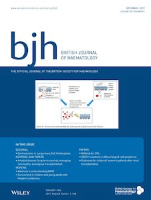
BRITISH JOURNAL OF HAEMATOLOGY
Shaping the Future of Hematological ScienceBritish Journal of Haematology, published by Wiley, is a leading journal in the field of hematology, with an impressive impact factor reflecting its significance in the medical research community. Established in 1955, the journal has consistently contributed to advancing knowledge in hematology, currently holding a prestigious Q1 ranking in the Scopus category of Hematology, placing it in the top 18% of the field. The journal encompasses a broad range of topics including clinical and laboratory aspects of blood disorders and hematological malignancies, making it an essential resource for hematologists, researchers, and healthcare professionals. With its commitment to publishing top-tier research and clinical studies, the British Journal of Haematology plays a critical role in shaping treatment approaches and improving patient outcomes worldwide. Please note that this journal does not offer Open Access options, ensuring that published content is rigorously curated for quality and relevance.
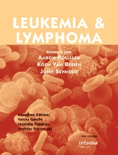
LEUKEMIA & LYMPHOMA
Empowering discoveries in hematology and oncology.LEUKEMIA & LYMPHOMA is a prestigious peer-reviewed journal published by Taylor & Francis Ltd, focusing on vital research in the fields of hematology, oncology, and cancer research. With an ISSN of 1042-8194 and an E-ISSN of 1029-2403, this journal is recognized for its high-quality and impactful contributions to understanding blood cancers, with a notable impact factor reflective of its influence. Since its inception in 1989, LEUKEMIA & LYMPHOMA has continuously provided a platform for researchers and professionals to disseminate their findings, fostering advancements in diagnostic, therapeutic, and clinical strategies related to leukemias and lymphomas. The journal ranks in the Q2 category for both Hematology and Oncology research categories as of 2023, underscoring its commitment to excellence. The journal is based in the United Kingdom and serves a global audience, making it an essential resource for those dedicated to improving outcomes for patients with hematological malignancies.
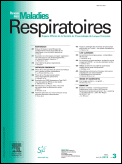
REVUE DES MALADIES RESPIRATOIRES
Enhancing understanding of respiratory diseases since 1984.REVUE DES MALADIES RESPIRATOIRES is a distinguished journal published by MASSON EDITEUR, focusing on the vital field of pulmonary and respiratory medicine. Established in 1984, this journal has become a prominent platform for sharing innovative research and clinical findings, reflecting an impressive array of studies that contribute to our understanding of respiratory diseases. With its ISSN 0761-8425 and E-ISSN 1776-2588, it facilitates access to scholarly work within the medical community, although it currently operates under a subscription model rather than Open Access. As indicated by its quartile ranking of Q4 in 2023 within its category and a Scopus rank of #128/155, REVUE DES MALADIES RESPIRATOIRES serves as an essential resource for researchers, professionals, and students aiming to stay informed about advancements in respiratory health. This journal plays a crucial role in fostering discussions that drive innovation and best practices in the treatment and understanding of respiratory conditions.